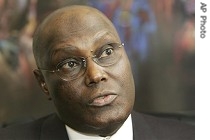2007年VOA标准英语-Vice President's Ballot Disqualification Stirs(在线收听)
Abuja
16 March 2007
The Nigerian Vice President Atiku Abubakar says he would contest in court his disqualification by the electoral commission. A a leading candidate for the April poll, he was excluded in the final official list. For VOA, Gilbert da Costa examines the implication of the vice president's exclusion from the upcoming election.
 |
| Atiku Abubakar |
"My reaction, it was not unexpected anyway," he said. "I will continue to challenge them in the courts. I will go up to the supreme court and if at the end of the day, if the courts indicate that I am wrongly disallowed to contest this election, any election that would have been held, which I am a party to will not stand. That is the law."
Opposition party, Action Congress, nominated Abubakar, but the electoral commission says the constitution bars him from running because he has been indicted for corruption by an administrative panel.
Supporters of Abubakar say his exclusion undermines the credibility of the poll, which would lead to the first civilian-to-civilian transfer of power in Nigeria's history.
An Abuja high court has ruled that the electoral commission has no power to disqualify candidates.
Emma Ezeazu, head of election watchdog Alliance for Credible Elections, says the electoral body's actions could compromise the integrity of upcoming elections.
"If they continue this way, if things are not rectified, it is clear that the outcome of the elections is not likely to be acceptable to Nigerians," she said. "Because in terms of disqualification, the courts have made it clear that INEC has no power to disqualify.
The presidential election is scheduled for April 21, while elections for state governors are a week earlier.
Election commission chairman Maurice Iwu denies the vice president's disqualification was politically motivated. He insists the constitution is very clear on persons indicted.
"Did anybody in his rightful mind expect that a commission that is established by law, that derives its whole authority to conduct elections by the constitution, to just stand aloof and folds its arms? So, our job, as it were, is more or less like sifting the apples from the oranges," he said. "We don't make the apples we don't make the oranges."
Abubakar's exclusion has raised fears of a violent backlash. More than 10,000 people have died in uprisings since the return to civil democracy in 1999.
Dan Fulani Mohammed, a professor of law at the University of Abuja and an expert in defense and national security issues, says the implication is grave for national security.
"No matter how this is interpreted either by the courts or by the politicians themselves, it has national security implications," he said. "And that is what I call on our politicians to think of…free, level playing field should be provided for candidates and therefore accusations, backdoor decisions should be removed in the interest of the Nigerian state. The logic is simple; we are in a competitive political terrain. Definitely he [vice president] has his followers, definitely he has his supporters. Anything that is political has reverberations across the entire land."
Nigeria, which has a population of 140 million people, is Africa's most populous nation and its largest oil producer.
President Olusegun Obasanjo and Atiku have ruled Nigeria since 1999 after nearly three decades of military rule. The two men fell out shortly after they were elected for a second term in 2003.